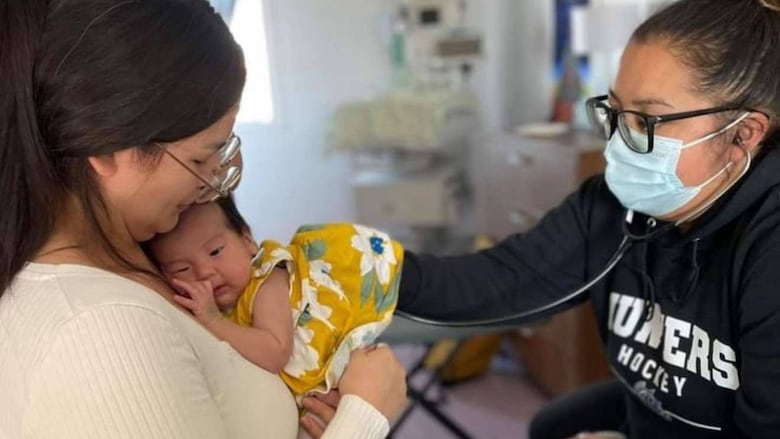Cree midwifery training in Northern Quebec gets a boost from regulatory change
Training program in Eeyou Istchee can now broaden its scope of practice to train more licensed midwives

A change to provincial regulations in Quebec means a midwifery program in Eeyou Istchee can broaden its scope of practice, and train more Indigenous midwives in their own communities.
The province amended its regulation this past spring to allow participants in Indigenous community-based training programs to do everything that licensed midwives can do.
That means that trainees don't need to live and attend a post-secondary institution down south to get the experience needed to complete their certification and become licensed midwives in Quebec.
"The law basically controls who can and who cannot do what are called 'reserved acts,'" said Jasmine Châtelain, the head of the Eeyou Istchee Pimaatisiiwin Chiskutimaachawin (EIPC) midwifery training program, which started earlier this year in Chisasibi and Waskaganish, Que.
"But that law excluded Indigenous people learning midwifery in community-based programs, even though it was written after Indigenous midwifery education programs started."
Shannon Chiskamish is a midwifery trainee in Chisasibi. After working as a birthing assistant, she pursued her dream of becoming a midwife.

She attended a midwifery program in Toronto for a year while raising her family. Being away from her home community was challenging, and she didn't complete that program. Now, the EIPC program has brought her closer to achieving her goal.
"In Toronto, it was just me and my baby and I had nobody over there, and my family was 20 hours away. So that's what I love about learning in my community," said Chiskamish.
"I just recently helped deliver my 12th baby… it's so amazing that I can stay home and learn from here and I don't have to move."

The Cree Board of Health and Social Services of James Bay (CBHSSJB) was part of the effort to change the provincial regulations.
Chiskamish says that the new regulations are good for expecting parents wishing to give birth in their home communities.
"Some families have a hard time trusting, because of intergenerational trauma and racism. Ever since we started the program and the clinic, families prefer to talk in Cree," said Chiskamish.
"They express more in their language than they would in English."
There are currently five midwives in the training program who help with workshops, cultural teachings, birthing, and translating if needed.
"I think it helps with trust and cultural safety," said Chiskamish.
Chiskamish says that returning Cree birthing practices to communities revitalizes traditions like dwelling births and placenta ceremonies, fostering stronger communities for future generations.

"We provide care until six weeks…but they always visit us or bring their babies whenever they're around. We see these kids grow up," said Chiskamish.
Chiskamish says she still receives invitations to walking-out ceremonies for the babies she has helped deliver.
Waskaganish and Chisasibi are the only Cree communities training midwives right now. Chiskasmish hopes the program will expand to other communities.
"I hope that we have future Cree midwives in every community," said Chiskamish.
For Jasmine Châtelain, the head of the midwifery training program, the regulation change is a step closer to having more Cree midwives in the region.
"It used to be that if someone was pregnant, they would know who to go to. That person was always there for them. And this is the same idea," Chatelain.
When Châtelain was first called upon to help create the Eeyou Istchee Pimaatisiiwin Chiskutimaachawin program, she often consulted with elders. One of the most important messages was that Cree should always be learning.
"No baby should be born here without a Cree person learning from it," Châtelain said.



